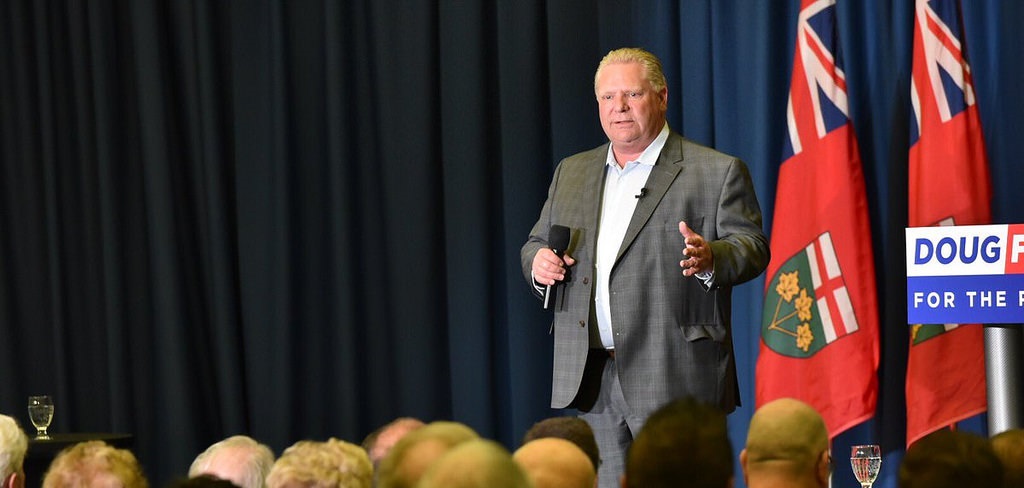Canada’s Treatment of Child Refugees Deemed Inhumane
And What the Government is Doing About This Harmful Policy
A former UN Special Rapporteur is bringing forth concerns about President Donald Trump’s recent controversy over the way undocumented children are being treated at the southern American border should not distract Canadians from what is happening inside our own country.
Francois Crepeau, a law professor and current director of McGill University’s Human Rights Centre, says Canada’s policy of preventing child refugees from reconnecting with parents is both “inhumane and degrading.”
“Being deprived of your parents by the law for no other reason than an immigration violation, which is not a criminal offence, is akin to cruel, inhumane and degrading treatment,” said Crepeau.
Children being intentionally kept from seeing their parents is an affront to existing international laws which cite the potential psychological and emotional damage from such actions.
For years the Canadian government has separated families at the border, citing security concerns and the risk of child exploitation through possible human trafficking cases.
But the government recently acknowledged it had no evidence to support the reasoning behind the policy.
“We see migrants who are undocumented as huge criminals because they violate national sovereignty and security, but it`s not the case,” Crepeau said. “The vast majority of undocumented migrants are totally innocuous, so the scare should not be there.”
Immigration Minister Ahmed Hussen says the government is continuously looking at ways to improve the system, citing both security and a welcoming process for newcomers.
“Once you get into movement of children between different countries and reuniting children with their parents, there’s a lot of issues that go into that with respect to identification, with respect to establishing legal custody and guardianship,” Hussen said.
Despite stated efforts, the Trudeau Government has been mostly quiet about how refugees and asylum seekers are processed, and any improvements to the system have yet to be announced.
All this comes at a time where this issue has once again been thrust into the spotlight after a Syrian refugee was arrested for the murder of a Canadian girl in British Columbia. The case is being used by hardliners to spotlight the refugee controversy at the expense of the Syrian-Canadian community.
Statistics Canada shows that despite cases like this, refugees and asylum seekers commit crimes at a lower rate than Canadian citizens. Immigration experts are encouraging Canadians to seek out facts regarding new Canadians before falling down the rabbit hole of fear, bigotry, and nationalism.
After all, the best way to ensure newcomers are adjusting well to coming to Canada is to make sure families are united once they arrive.
“The government should say that children need their parents,” Crepeau said. “Any Canadian [or refugee] child who has undocumented parents has the right to ask for their parents to be documented, period.”
Newfoundland Offers More Opportunities to Immigrants
A Look at Canadian Immigration Policies That Actually Work
The Newfoundland provincial government recently loosened its bureaucratic reigns for new immigrants, establishing the international entrepreneur and international graduate entrepreneur under its provincial nominee program making it easier for ambitious newcomers to choose to stay in the province after graduating.
The move is seen as a way to attract immigrants with an entrepreneurial bent, helping them find a foothold in various Newfoundland communities and in-turn keeping the economy robust and diverse.
Over the past decade, Newfoundland has seen its reputation for attracting professionals in advertising and technology rise well above the national average, turning cities like St. John’s into a hub for industry leaders who do not want to set up their main offices in traditional metropolitan areas like Toronto or Vancouver. Even after the offshore oil boom came crashing down, the city still manages to accentuate the positives.
This new decision by the province hopes to keep that momentum going, with a focus on businesses owned by immigrants who are looking for reasons to remain in the province and contribute through innovation and business.
International students will have the opportunity to set up a business for one year, meeting specific milestones along the way that will allow them to set up shop permanently. After that first year, the business owner can apply for permanent residency.
There is a hope within government circles that ideas like this will spread across the country, with provinces providing incentives to keep skilled immigrants from leaving Canada once they graduate.
A poll by The Canadian Press/Ekos Politics claimed St. John’s as Canada’s most open city. This revelation comes at a time when nationalist movements are flourishing worldwide, and when anti-immigrant sentiment seems to be on the rise.
St. John’s is seen as a friendly destination for immigrants, where populist politics is not sustainable. It is a tribute to the character of the people of Newfoundland, and this new program for immigrants is seen as one of the building blocks that will help perpetuate the province’s reputation for being a welcoming place for new Canadians.
"It is a pretty friendly place," Ekos President Frank Graves recently told CBC. "It may be the case that if you live in an ethnically homogenous, smaller city, you tend to be less open but obviously that's not always the case."
Time will tell whether or not this new endeavour will translate into more new immigrants remaining in the province but judging by the reaction from the government and immigrants alike, the end result looks like a win for both.
Doug Ford Evokes Fear as Refugees Seek Asylum
Divisive Rhetoric and Language Used to Delegitimize and Dehumanize
Premier Doug Ford has embarked on a fear campaign against refugees, using divisive language to polarize the electorate’s views.
Attempts to demonize and delegitimize asylum seekers and refugees with terms like “illegal border crossers” is inappropriate and politically unsustainable. This is a highly derogatory way to refer to people whose lives have been upended in their homelands, and who come to Canada in search of security and a better life.
Reliance on such labels also implies rule-breaking or that refugees are somehow “sneaking” through Canada’s borders under false pretenses. This language is highly evident in how Ford has placed blame for the “mess” at the feet of the Federal Government.
Using such terminology has a dehumanizing impact on refugees seeking to escape a situation that already dehumanizes them. Ford’s unwillingness to accurately depict the legitimacy of making a refugee claim in Canada is a testament to how politics of fear can impact the public’s perception.
This approach also feeds into mistaken beliefs that immigrants and refugees bring an increase in crime rates with them. In fact, immigrants and refugees commit crimes at a lower rate than homegrown Canadians.
What’s more, they are also more likely to become entrepreneurs who help grow the economy. But Ford’s insistence on framing the refugee issue as a danger to our country means he and his party are betting that the Canadian public will ultimately retreat to a position of fear, division, and bigotry.
Earlier this year, Prime Minister Justin Trudeau met with the new Ontario premier and had much to say regarding the Canadian refugee file.
“It's important as leaders in Canada to continue to protect one of the great advantages that Canada has over so many other countries — particularly at this time — that Canadians are generally very positively-inclined towards immigration,” Trudeau offered after he met Ford in July.
“People know that people coming here to build better lives for themselves actually contribute tremendously to our country and to our success, and this is something we're going to continue to ensure — that our immigration and refugee system is applied responsibly.”
Both the United Nations and Amnesty International have encouraged Canadian politicians and media representatives to consider the negative ramifications of referring to refugees as “illegal”.
“There’s nothing illegal when you come and you cross an international border to claim asylum,” Jean-Nicolas Beuze, a representative from the UN High Commission on Refugees told Global News recently. Canada’s Immigration and Refugee Protection Act (IRPA) is “very clear” on that fact, Beuze says.
Parent Sponsorship Lottery Swapped for First-Come-First-Served System
Liberals Swap Out Lottery System in Parent Sponsorship Program, But New Approach Requires Greater Transparency and an End to Quotas
A new federal policy is putting an end to an unpopular parent sponsorship lottery that reunited immigrants with their parents and grandparents. In its place, the federal government has announced that a first-come-first-served system that will replace the lottery system. Canadian immigration lawyers have been cautiously optimistic about the announcement, and for a good reason.
This year, our practice had several clients who met all sponsorship requirements yet were not selected by the lottery draw. These clients were frustrated by the randomness of the system, and like many Canadians, recommended a change.
Minister Ahmed Hussen and the federal government have delivered a change, but it remains to be seen whether or not it’s for the better.
The federal government must still maintain transparency over how this new system operates. Although the random element has been removed, applications and eventual selection may still rely on the luck of the draw. This first-come-first-served system may come down to the exact second applicants submit an expression of interest.
Demonstrating when an individual submitted their expression of interest is of the utmost importance. Will the government publish reports explaining how and why the first 20,000 were selected?
What’s more, the cap (though raised to 20,000 for 2019 from this year’s 17,000) is still a quota system, despite overwhelming popularity and demand for family sponsorship.
Still, at face value, the new system is a step in the right direction. Minister Hussen cited feedback heard from Canadians and immigrants concerned about the random selection of the lottery system as a reason for the changes.
There are other positives, too. When the Liberals took office in 2015, the sponsorship lottery cap was at a too-low 5,000 cap. Since taking office, this government has also worked to decrease family sponsorship application backlogs. In 2011, this backlog was a staggering 167,000 applications, a remarkably high number given the annual cap imposed by the previous government.
While some improvements have been made to this program, there is still plenty of room for improvement. Given the popularity and demand for this program, the quota in place continues to limit and impede family reunification.
Transparency will ultimately determine whether or not this first-come-first-served approach marks a meaningful improvement over the lottery system. These changes are scheduled to roll out in 2019. For help in navigating family reunification and sponsorship programs, please don’t hesitate to contact Gerami Law PC today.
Is It Getting Easier to Hire Temporary Foreign Workers?
Federal and Provincial Business Immigration Programs are Showing Improvements, But There's Still Work to Do
Immigration lawyers say there have been improvements over recent years for businesses looking to hire immigrants on a temporary basis. The federal and provincial governments in Canada seem to be listening to the concerns of business owners, but challenges still remain in Canada for businesses hiring temporary foreign workers. The government must show greater clarity and make adjustments to policy to give businesses the tools they need to hire appropriate, skilled labour.
How does the Temporary Foreign Worker program work?
Canadian business looking to hire temporary foreign workers can apply either through the temporary foreign worker program or the international mobility program. Employers using the temporary foreign worker program need to prove that they cannot fill the skilled position with a qualified Canadian first before applying for an immigrant worker. A labour market impact assessment needs to be filled out through Employment and Social Development Canada (ESDC) to determine if there is a need for foreign labour.
Canadian immigration lawyers say this process suffers from a lack of transparency. The ESDC offices across Canada all handle these impact assessments differently and officials use too much of their own discretion. A unified federal policy would help to create consistency across Canada.
What is a Labour Market Assessment?
- The employer must advertise the position for a month;
- If there are applicants, the employer must explain to the ESDC why those candidates are not qualified;
- The employer must show that they will be paying and providing work conditions that meet Canadian industry standards;
- The process can take between three to five months;
- Some applications can take even longer than six months.
The Global Skills Strategy
The federal government announced in 2016 and then rolled out in 2017 the Global Skills Strategy to expedite the process for employers looking to hire foreign workers. Employers who qualify must complete a labour market benefits plan to show that the employer is creating jobs for Canadians or investing in skills and training of Canadians and permanent residents of Canada. The federal government promises a two-week processing time for labour market assessments through the Global Skills Strategy.
The International Mobility Program
The International Mobility Program is for those immigrants exempt from the labour market assessment process looking to work in Canada. Workers who may fall under this program include occupations specified in international agreements such as trade deals, workers with skills considered a significant benefit to Canadian interests, refugees and destitute students.
The number of temporary foreign workers approved by ESDC has declined from 199,218 in 2012 to 90,211 in 2015. Challenges remain for employers who are subject to random audits and must follow increasingly strict compliance regimes. Some Canadian immigration lawyers believe Canadian businesses would benefit from a more unified federal policy.





